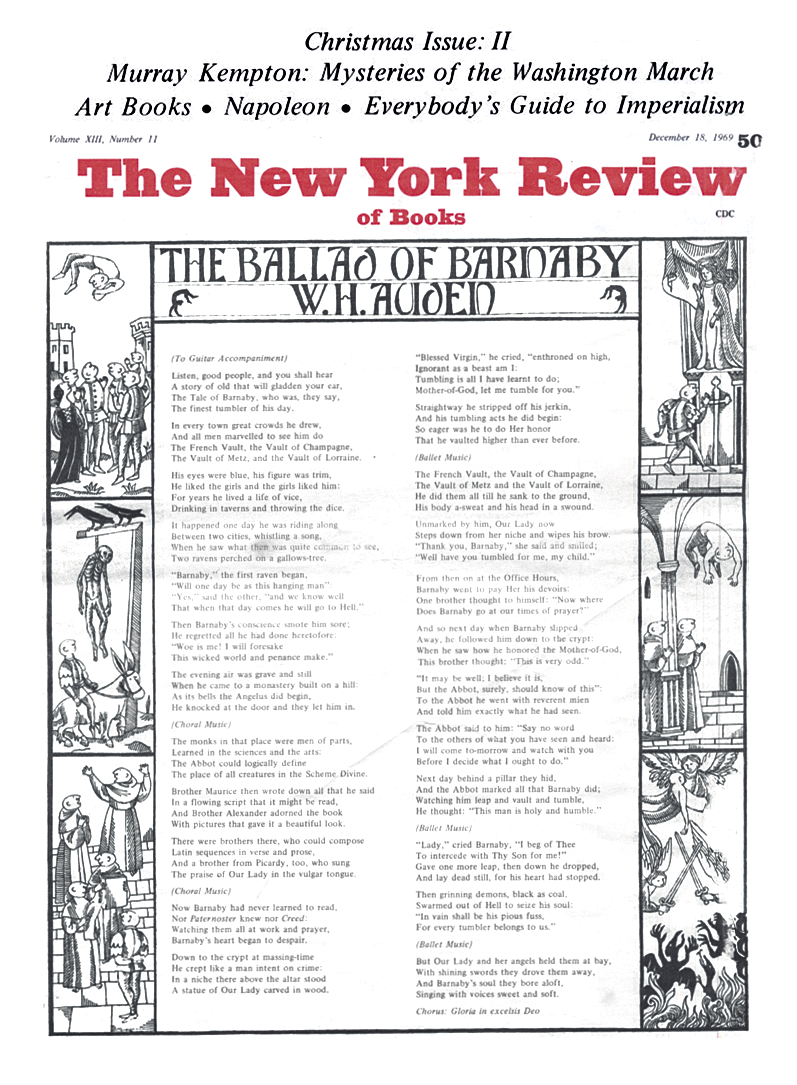(To Guitar Accompaniment)
Listen, good people, and you shall hear
A story of old that will gladden your ear,
The Tale of Barnaby, who was, they say,
The finest tumbler of his day.
In every town great crowds he drew,
And all men marvelled to see him do
The French Vault, the Vault of Champagne,
The Vault of Metz, and the Vault of Lorraine.
His eyes were blue, his figure was trim,
He liked the girls and the girls liked him:
For years, he lived a life of vice,
Drinking in taverns and throwing the dice.
It happened one day he was riding along
Between two cities, whistling a song,
When he saw what then was quite common to see,
Two ravens perched on a gallows-tree.
“Barnaby,” the first raven began,
“Will one day be as this hanging man”
“Yes,” said the other, “and we know well
That when that day comes he will go to Hell.”
Then Barnaby’s conscience smote him sore;
He regretted all he had done heretofore:
“Woe is me! I will foresake
This wicked world and penance make.”
The evening air was grave and still
When he came to a monastery built on a hill:
As its bells the Angelus did begin,
He knocked at the door and they let him in.
(Choral Music)
The monks in that place were men of parts,
Learned in the sciences and the arts;
The Abbot could logically define
The place of all creatures in the Scheme Divine.
Brother Maurice then wrote down all that he said
In a flowing script that it might be read,
And Brother Alexander adorned the book
With pictures that gave it a beautiful look.
There were brothers there, who could compose
Latin sequences in verse and prose,
And a brother from Picardy, too, who sung
The praise of Our Lady in the vulgar tongue.
(Choral Music)
Now Barnaby had never learned to read,
Nor Paternoster knew nor Creed:
Watching them all at work and prayer,
Barnaby’s heart began to despair.
Down to the crypt at massing-time
He crept like a man intent on crime:
In a niche there above the altar stood
A statue of Our Lady carved in wood.
“Blessed Virgin,” he cried, “enthroned on high,
Ignorant as a beast am I:
Tumbling is all I have learnt to do;
Mother-of-God, let me tumble for you.”
Straightway he stripped off his jerkin,
And his tumbling acts he did begin:
So eager was he to do Her honor
That he vaulted higher than ever before.
(Ballet Music)
The French Vault, the Vault of Champagne,
The Vault of Metz, and the Vault of Lorraine.
He did them all till he sank to the ground,
His body a-sweat and his head in a swound.
Unmarked by him, Our Lady now
Steps down from her niche and wipes his brow.
“Thank you, Barnaby,” she said and smiled;
“Well have you tumbled for me, my child.”
From then on at the Office Hours,
Barnaby went to pay Her his devoirs:
One brother thought to himself: “Now where
Does Barnaby go at our times of prayer?”
And so next day when Barnaby slipped
Away, he followed him down to the crypt:
When he saw how he honored the Mother-of-God,
This brother thought: “This is very odd.”
“It may be well; I believe it is,
But the Abbot, surely, should know of this”:
To the Abbot he went with reverent mien
And told him exactly what he had seen.
The Abbot said to him: “Say no word
To the others of what you have seen and heard:
I will come to-morrow and watch with you
Before I decide what I ought to do.”
Next day behind a pillar they hid,
And the Abbot marked all that Barnaby did;
Watching him leap and vault and tumble,
He thought: “This man is holy and humble.”
(Ballet Music)
“Lady,” cried Barnaby, “I beg of Thee
To intercede with Thy Son for me!”
Gave one more leap, then down he dropped,
And lay dead still, for his heart had stopped.
Then grinning demons, black as coal,
Swarmed out of Hell to seize his soul:
“In vain shall be his pious fuss,
For every tumbler belongs to us.”
(Ballet Music)
But Our Lady and her angels held them at bay,
With shining swards they drove them away,
And Barnaby’s soul they bore aloft,
Singing with voices sweet and soft.
Chorus: Gloria in excelsis Deo
This Issue
December 18, 1969


